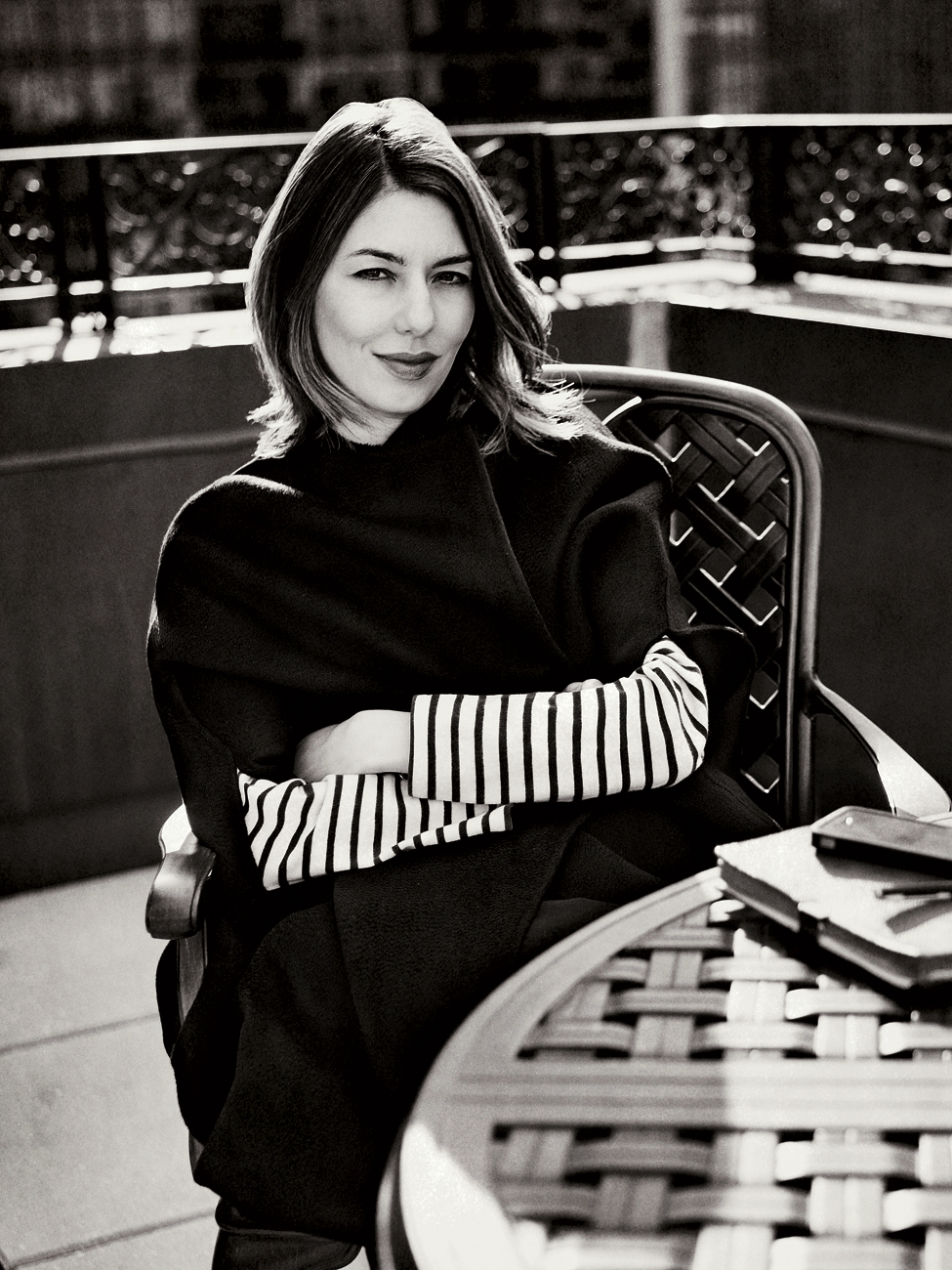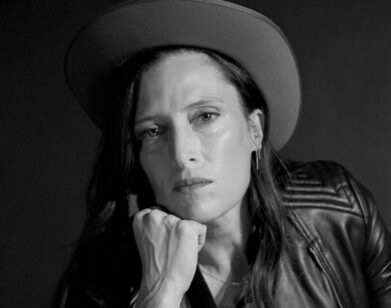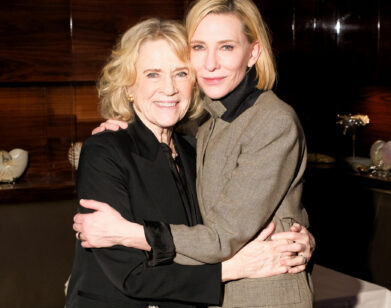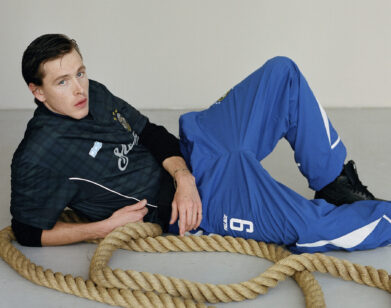Legends: Sofia Coppola

With the 75th anniversary of the iconic sunglasses manufacturer, Ray-Ban underway, INTERVIEW celebrates the NEVER HIDE moments of a few influential leaders in art, fashion, music and film. We’ve met quite a few characters over the decades, but here are some of our favorite interviewees and icons, artists who never shied away from marching to the beat of their own drum. Here we talk to Sofia Coppola:
Scion of a legendary film family that includes Francis Ford Coppola, Talia Shire, Nicolas Cage and Jason Schwartzman, friend of the fabulous—Sofia Coppola did not face the same obstacles as most aspiring young directors. She’s had a spot bookmarked for her among Hollywood’s elite since she was born… hasn’t she? It is tempting to see things this way, now that Sofia is so successful—and certainly connections are an invaluable asset—but Coppola’s route to respected director was not as smooth as one might think.
Whether she liked it or not, Coppola began her directing career—really, all her careers—as “Daddy’s little girl.” Constant comparisons, dismissals (nothing but a spoiled legacy), skepticism; the public did not exactly welcome her into film. In her early-adulthood, she floundered, dabbling in acting, fashion design, art school and costume design. She was overshadowed, not only by her family, but also by her first husband, renowned music video director, Spike Jonze (the man who got Christopher Walken to bust some pretty amazing moves in Fatboy Slim’s “Weapon of Choice“). Sofia Coppola the daughter and wife, rather than Sofia Coppola the individual. Taking this into consideration, Coppola’s ascent no longer seems so assured.
It’s hard not to respect a woman who managed to free herself from her father’s shadow, and acquire such a reputation in a largely male-dominated profession (let’s not forget that Kathryn Bigelow is the first and only female director to win the coveted Best Director Oscar for 2009’s Hurt Locker). After only four films, there is already a distinct “Sofia” style of film: contemplative, nuanced character studies, where seemingly very little happens, but you can’t stop thinking about the movie afterwards. Coppola takes that golden rule of story telling—the “show, don’t tell” ever-repeated by English teachers and literary editors—seriously. Everyone wants to be in a Sofia Coppola film. “I always tell [Sofia] that she made me cool again,” Stephen Dorff told us, the star of Coppola’s Somewhere (2010). “Somewhere changed my image around the world. You get so much more press, and you do more magazine coverage, talk to more journalists. People are interested in the film, because [Sofia]’s a special filmmaker and there are not that many of them,” Dorff continued.
Coppola is currently filming her fifth feature film and fourth original screenplay, The Bling Ring, with Emma Watson. It was only 12 years ago that we first spoke with Coppola, just after she’d completed her first film, an adaptation of Jeffrey Eugenides‘ novel The Virgin Suicides (1999)—the project that made the world realize Sofia is much, much more than just a famous last name. “I think it would be an improvement on my films if I didn’t do so much,” Coppola’s father told us when asked about his daughter’s directing style. While it is easy to appreciate the subtleties of The Virgin Suicides today—the emphasis on subdued esthetics rather than superfluous dialogue—at the time of Suicide’s release both the box office and award ceremonies were dominated by action-packed, big-budget dramas such as Gladiator, Castaway, Erin Brokovich and Mission Impossible 2, and tween-orientated romances e.g. Coyote Ugly, Cruel Intentions and anything involving Freddie Prinze Jr. As the New York Times observed in its April 2000 review of the film, Ms. Coppola “succeeded in her efforts to find a visual idiom appropriate to the lush melancholy of the novel’s language.”
Like her films, Sofia kept her answers succinct in the interview reprinted below, careful not to reveal too much.
Sofia Coppola by Lisa Krueger, April 2000
The terror of suburban adolescence has been explored and exploited in millions of films, but Sofia Coppola, in her debut movie, The Virgin Suicides, really gets the subject. Here she speaks with fellow director Lisa Krueger.
LISA KRUEGER: When you read The Virgin Suicides [1993] by Jeffrey Eugenides, did you immediately say “I want to make a movie of this?”
SOFIA COPPOLA: I guess when anyone reads a book, you picture it. But that one was really vivid and stayed with me after I read it. I went back to it a couple of years later and started looking at it again. Then I heard they were doing a movie of it. I wasn’t planning on directing a movie; I spent my twenties not knowing what I wanted to do and trying a million different things. Anyway, I heard the movie was going to be really dark and more violent and sexual and all thee things, and when I heard that, it motivated me to feel protective of the book and think, “No, it shouldn’t be like that; it should be like this.”
KRUEGER: You were on a rescue mission.
COPPOLA: Yes.
KRUEGER: As opposed to “I want to be a director now.”
COPPOLA: Maybe subconsciously I wanted to be a director, but to admit that would be too scary.
KRUEGER: You’ve done a lot of things. You’ve done acting, and I know you were a clothing designer.
COPPOLA: I have a little clothing company with a friend. And I tried going to art school after appearing in Godfather III, when I realized that acting wasn’t something I still wanted to pursue. [laughs]
KRUEGER: Do you think acting might have in some way led you to directing?
COPPOLA: It’s weird, because I never studied directing and never really thought about doing it, and then I just found myself in that situation and tried it. I like to be observing everything else, and I get self-conscious in front of the camera.
KRUEGER: That’s interesting, because in The Virgin Suicides you approach the story of the five Lisbon sisters like an observer or a photographer, which I know you’ve done as well.
COPPOLA: Yeah, I wanted the story to be from the boy-across-the-street’s view as a neighbor, so it was always at a distance.
KRUEGER: I wanted to talk about how you got to the heart of the whole teen thing in your movie.
COPPOLA: I liked that the story seemed to capture what it was like to be that age, something that I haven’t seen many people get right. It just seemed really authentic to me. You know, the way you can be obsessed with these little details of something that someone owned. Also how strong your feelings are the first time you fall in love. The obsessiveness and all that.
KRUEGER: I liked the way you use songs in the movie, the way the girls play songs to the boys and the boys play songs back. They completely give up on verbal communication, which is just like what you do when you’re a teenager.
COPPOLA: That back-and-forth conversation was in the book.
KRUEGER: Would you say that you yourself had a so-called “normal” teen life?
COPPOLA: My whole upbringing was pretty unconventional, because we would always go on location with my dad. But I went to high school in a small town in the Napa Valley. It was pretty normal.
KRUEGER: That was part of your family’s decision not to be in Hollywood.
COPPOLA: Yeah. I remember when I was in high school, I was a little too cool to be a teenager. So with the movie it was fun to go back and really get into being a teenage because sometimes…
KRUEGER: Youth is wasted on the young.
COPPOLA: Right.
KRUEGER: Is there anything you learned about your own teen years by making this film?
COPPOLA: I’m not sure. I just knew it was fun to delve into that world, and to try to pay more attention to the boys’ point of view as well—because I related more to the girls sitting around.
KRUEGER: You’re making a film about girls, although it’s from the boys’ point of view, but you’re a girl—so it’s almost a double negative.
COPPOLA: And the author was a man.
KRUEGER: I’ve seen a lot of films from the male point of view where the girls are presented as these otherworldly goddesses, and they never really made sense to me. Whereas I saw your girls as just total creatures of fascination.
COPPOLA: Oh, good. I think it’s all about backlighting.
KRUEGER: Growing up in a family where everyone was so creative, did you feel any pressure to work in movies?
COPPOLA: My parents were always encouraging of us being creative however we wanted to be. People say, “You didn’t get pressured into having to be a director?” But it’s hard to be around my dad and not be curious about filmmaking, because he thinks it’s the ultimate medium.
KRUEGER: What’s it like being married to another director, Spike Jonze?
COPPOLA: It’s nice to have that in common and to understand what the other person is going through. But we have such different sensibilities and we don’t really collaborate.
KRUEGER: What would your dad have said if you’d wanted to go work on Wall Street?
COPPOLA: I know he’d be happy to have someone to run our winery business. But there’s no hope for that!
KRUEGER: Maybe on of your kids will do it.
COPPOLA: Maybe. Spike has a good business streak, which I don’t have, so maybe one of our kids will get that.
KRUEGER: Some people may wonder whether you had this inclination to retreat from anything having to do with your father’s work as a director. But it’s obvious you didn’t need to. There’s this sense that The Virgin Suicides could in no way be taken as anything other than your own film.
COPPOLA: I feel it reflects my own personality.
KRUEGER: Definitely.
COPPOLA: But you know there are people who say, “Daddy made it for her.”
KRUEGER: Well, I think the film itself refutes that so eloquently, with such a total confidence. Can you talk a bit about what it was like to work with experienced actors who you knew already?
COPPOLA: Well, Kathleen Turner, who plays the mother of our family of girls [the Lisbon family], I knew before—as I did Scott Glenn, who plays a small part as a priest. But James Woods, who plays the father, I hadn’t known before. And of course he has this reputation. [laughs] But as soon as we started working I was impressed that he got so into the story and was willing to do a small part.
KRUEGER: I saw an interview with him where he said, “I’d marry her if I could.”
COPPOLA: Yeah, we had a whole love-fest on the set. James Woods kept us entertained for sure.
KRUEGER: What was it like relating to Kathleen Turner, whom you knew as a kid, not only as an adult but as a director?
COPPOLA: It was strange at first, probably more so for her. But once we started rehearsing she was really open to how I wanted things.
KRUEGER: Since you’ve been a costume designer yourself, were you really involved in recreating the ’70s-type clothes in your movie?
COPPOLA: Because it’s in the ’70s I didn’t want to be over-the top, so I chose a designer, Nancy Steiner, who was good at making the movie reflect an era but still keeping things subtle. It’s true that I’m picky about costumes, but I chose someone I really respected and then let her do her thing.
KRUEGER: Speaking of the clothing, that shot of your star, Josh Hartnett, walking down the hall at school in a kind of androgynous swagger, was worth the price of admission. Is that the way he normally walks?
COPPOLA: No, he doesn’t. He says the walk was a little like Jim Morrison.
KRUEGER: Totally. It’s very ’70s. It would be hard to walk that way if you’re not wearing hip-huggers and bell-bottoms.
COPPOLA: Oh, yeah. I love that Nancy put him in a burgundy velvet suit.
KRUEGER: What’s next on your agenda?
COPPOLA: I want to write another script. An original story, though that seems really daunting to me.
KRUEGER: What was your favorite part about directing?
COPPOLA: I liked shooting the movie. We shot really fast, so we didn’t have a lot of time. It was like barreling through everything.
KRUEGER: I remember when we made Manny & Lo we had so little time. I was talking about that to somebody, and they said, “You know, sometimes there’s nothing worse than having too much time to shoot a movie. Because the less time you have, the more you rely on your unconscious to make really quick, split-second decisions.”
COPPOLA: I definitely thought that.
KRUEGER: Finally, what was the part of directing you like the least?
COPPOLA: Music clearances.
THIS INTERVIEW ORIGINALLY APPEARED IN THE APRIL 2000 ISSUE OF INTERVIEW.






